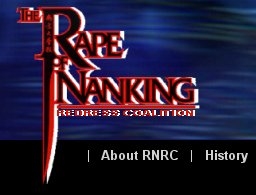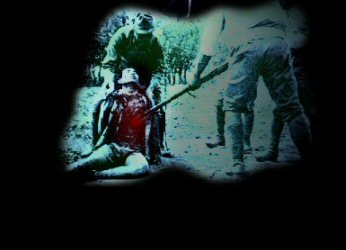
|
|

|
History
- World War II The Japanese Imperial Army began its invasion of China and domination of Asia of Asia in the 1930's, long before the start of World War II. History estimates that by 1945 the Army had murdered 15-30 civilians alone. Japanese imperialists committed atrocities on a scale that exceeded the extermination of the European Jewry by Nazi Germany. The Rape of Nanking is emblematic of Japan's W.W.II atrocities throughout Asia, which include the enslavement of the "Comfort Women", and the germ and chemical warfare experimentation on humans by Unit 731. The Atrocities began as early as the Japanese Imperial Army's deployment in Korea. Young women were kidnapped and forced into sexual slavery as "Comfort Women". Forced to endure dozens of rapes each day, such women often committed suicide rather then live with this shame. In China, men were taken prisoner and used by the notorious Unit 731 of the Japanese army as laboratory subjects for barbaric bacteriological and chemical experiments. Unit 731 test numerous poisons on their helpless victims, observing and recording their agonizing deaths. The horrors of W.W.II in Asia are best symbolized by the Rape of Nanking episode. After Nanking fell to the Japanese forces in December 1937, the Imperial Army murdered 150,000-300,000 unarmed civilians, including woman and children. During a horrific period of six weeks, men were burned, buried alive, and used for target practice. Women were raped and killed. Infants were bayoneted in the arms of their parents. The current Japanese government steadfastly denies this orgy of murder and mayhem unleashed by the advancing Japanese Imperial Army. Instead, the Japanese government has attempted to rewrite the history of its sordid conduct during W.W.II by issuing school textbooks that deny the imperialist aggression, and make war heroes commanders who ordered or sanctioned the commission of war crimes. The Japanese Government evades its obligation by hiding behind the 1951 peace treaty and other bilateral international agreements. These treaties were simply political expedient actions formulated to resolve issues between governments. The 1951 Peace Treaty neither absolved Japan of its moral responsibility to its victims in Asia in Asia nor extinguished claims brought by the victims of these atrocities. Japan has been stonewalling legitimate demands for apology and reparation. The Japanese government can only atone for its war crimes by formally apologizing and making reparations through comprehensive legislation enacted by the Japanese Diet, signed into law by the prime minister and endorsed by the Emperor. Until these demands are met, RNRC urges the United States Government to block Japan's admission to the Security Council of the United Nations as a permanent member, and to use all available diplomatic and economic pressures to secure Japan's acknowledgement of its shameful past and its commitment to present-day justice for its victims, living or dead. the Rape of Nanking Redress Coalition (RNRC) has joined the international movement to rectify more then half a century of denial and injustice. The RNRC is dedicated to securing the appropriate and timely redress from the Japanese government. Co-chair by the Hon. Lillian K Sing and Dr. Clifford Uyeda, the RNRC is a non-profit, tax-exempt, community-based organization. RNRC undertakes educational programs and community action to increase public awareness of the war crimes committed in Asia during W.W.II RNRC seeks to mobilize support for demand that Japan formally issue a national apology, institutionalize programs and remembrance for the nation, and initiate meaningful reparations and just compensation for the victims. |

